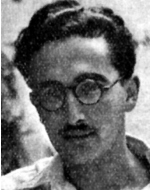Halevy-Horowitz, Shmuel (Molik)
Was born on 19 September 1962 in the city of Leningrad, Russia, and immigrated to Israel with his family in 1925. He studied in the kindergarten for example and was accepted at an early age for the second preparatory program at the Herzliya Gymnasium in Tel Aviv. Was a good-hearted and conscientious boy who read eagerly. Even during school breaks, they would find him absorbed in reading through the steps of the library scale or asking for a book that particularly attracted him. At home, he received a national religious education, and on Saturdays, discussions were held in the family about problems of religion and morality, Judaism and Zionism, which revolve around the weekly Torah portion. Despite his inclination to literary subjects, he felt obliged to devote himself to agriculture. When he was 15, he moved to the agricultural school in Pardes Hannah and a year later moved to Mikvah Israel. In 1940 he graduated from high school, especially in Hebrew and Jewish studies. He worked in his father’s orchard in the village of Hibat Zion, and with his great devotion to the family he continued to bear the burden of the difficult days of the orchard. In addition, he participated in the village’s public life, wrote occasional plays and humorous songs for celebrations and parties. His taste was excellent and his artistic sense was well developed. He brought into the house the best poetry, prose and current literature. Be aware of the problems of the people. “I have one problem: the plight of the Jews in the world … anything that will help the existence of the Jewish people – good and permitted,” he wrote to his friend. Was a member of the Haganah. During the period of the riots he saw humiliation in the method of restraint and with the outbreak of World War II he blessed the sword that would wipe out Nazi Germany. “In a world of wolves, the lamb must also be armed with nails, and then there is hope that ears will be attentive to the vision ‘and a wolf will live with a lamb.'” During the Second World War he left the farm, joined the Nutras and served in Ein Hahoresh. During the British siege on Givat Haim, he felt the need to help the agriculture with the people of the nearby settlements. He stood in the protective chain and excelled in his influence on the British soldiers. With the outbreak of the War of Independence, he was partially recruited and in April 1948 he was drafted and assigned to the 7th Brigade. The security committee in the village was granted permission to retain him as a guide and a member of the Haganah. He was loved by his comrades and commanders. Everyone recognized him as courageous, lively and lively, excellent with wit and joking as a “good mood” prepared for every opportunity. He fulfilled his duties as a company salesman with great devotion and responsibility without fatigue or rest, according to the testimony of his commander. On the 29th of Iyar 5708 (7.6.1948) a truck took off on a mine on its way from Latrun to Hulda. In this truck Shmuel went to bring water to the front. In a difficult situation, he was transferred to the “Bilu” hospital and from there to Hadassah Hospital in Tel Aviv and died on the same day.
